About King Dasaratha
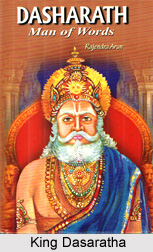 Dasaratha was the Great King in the epic "Ramayana", who was the father of Lord Rama, the hero of the epic and the avatar of Lord Vishnu. Dasaratha was the scion of Raghuvamsa and the King of Ayodhya. He had three wives namely Kaushalya, Kaikeyi and Sumitra. The son of Kaushalya was Rama, son of Kaikeyi was Bharata and son of Sumitra were Lakshman and Shatrughna. Dasaratha and Kaushalya had one daughter, named Shanta, who was the wife of Ekashringa.
Dasaratha was the Great King in the epic "Ramayana", who was the father of Lord Rama, the hero of the epic and the avatar of Lord Vishnu. Dasaratha was the scion of Raghuvamsa and the King of Ayodhya. He had three wives namely Kaushalya, Kaikeyi and Sumitra. The son of Kaushalya was Rama, son of Kaikeyi was Bharata and son of Sumitra were Lakshman and Shatrughna. Dasaratha and Kaushalya had one daughter, named Shanta, who was the wife of Ekashringa.
Four key events of Ramayana direct the entire tragedy of King Dasaratha`s life.
Event 1: The first story is about Dasaratha and Ravana. Hearing Dasaratha`s fame Ravana felt jealous and sent messengers to his court asking for his homage and regard otherwise threatened for the war. In reply Dasaratha shot off arrows and told the messengers that when they will return to Lanka they would found that main gates of Lanka to be shut closed by the arrows. Ravana felt humiliated at this defeat and took it as his insult. He also realized that King Dasaratha was superior to him. Then Ravana took a severe penance to pacify Lord Brahma. When Brahma appeared before Ravana, he asked him not to bless Dasaratha with the gift of child.
Event 2: Dasaratha was famous for his miraculous ability to hunt blind and shooting arrows by hearing the sound only. Once during one of his hunting expeditions, Dasaratha heard a noise resembling elephant drinking water and shot an arrow in the direction in quest of his prey.
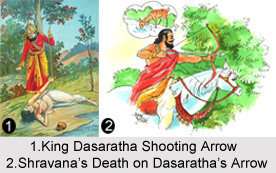 But to his astonish Dasaratha noticed that he had instead shot an young boy named as Shravana Kumar who was collecting water in a pitcher for his blind parents. Shravana Kumar was the only child of his parents and his parents were totally dependent on him. Shravana used to carry his parents everywhere on two pans of balance supported on his shoulder and collect water to quench their thirst.
But to his astonish Dasaratha noticed that he had instead shot an young boy named as Shravana Kumar who was collecting water in a pitcher for his blind parents. Shravana Kumar was the only child of his parents and his parents were totally dependent on him. Shravana used to carry his parents everywhere on two pans of balance supported on his shoulder and collect water to quench their thirst.
At his death Shravana was inconsolable at the thought that his parents would be without any support to protect them. As his dying wish, Shravana asked the king to carry water to his thirsty parents. Dasaratha carried the water to the old couple and they drank the water without knowing that it was not being offered by their son. The king then hesitantly narrated the death incident of Shravana Kumar to his parents. The old couple was so distressed at the pathetic news of the death of their son that Shravana`s father cursed king Dasaratha that one day he too would suffer from "Putrasoka"; grief of separation from one`s son. The old couple then sacrificed their lives, as they did not want to live anymore after consuming water offered by their son`s killer.
Event 3: King Dasaratha also fought for the gods in the battle against Asuras and Kaikeyi acted as his charioteer. Kaikeyi saved Dasaratha`s life during the battle. Dasaratha was so pleased with Kaikeyi that he asked her to wish two boons, on which Kaikeyi said that she would ask when she wished to avail them. These three incidents played a significant role to make Dasaratha`s fate.
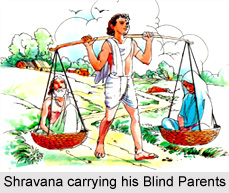
Event 4: By Ravana`s wish he had no sons, which he was able to overcome by performing the horse sacrifice to obtain children. Dasaratha was blessed with four sons. When the boys were grown up, Dasaratha decided to retire and embrocate his eldest son Rama to the throne of Ayodhya. Before the anoint ceremony took place Kaikeyi asked Dasaratha to grant him boons according to good old promise. She asked for the first boon her son Bharata`s enthronement instead of Rama and for the second boon she asked Rama`s exile to forest for 14 years. Dasaratha was helpless and he must grant the boons to maintain the truth, which was "Kshatriya dharma". After Rama left Ayodhya Dasaratha could not bear the pain of the separation from his most beloved son. Unable to withstand the anguish, the dispirited king Dasaratha died out of grief and pain and thus Shravana`s blind parent`s curse came true.
Dilemma of King Dasaratha
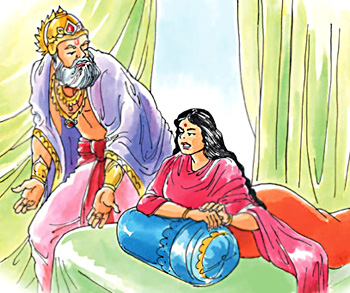 The Dilemma of King Dasaratha is included in the Ayodhya Kanda. Dasaratha, the king of Ayodhya, was in a dilemma when he heard about the tow boons of his queen Kaikeyi. Earlier, Dasaratha`s life was saved by Kaikeyi during a war with the Asuras and Dasaratha offered the queen with two boons which the queen reserved for the future. When Kaikeyi got the news of Rama`s coronation to the throne of Ayodhya from her evil-minded maid-servant Manthara and after her continuous evil counsel, Kaikeyi became furious and desired her son Bharata to be the king of Ayodhya and the banishment of Rama to the jungle for fourteen years. After hearing this from Kaikeyi Dasaratha became speechless and was in a severe dilemma of whether to keep his words given to Kaikeyi or the coronation of his beloved son Rama.
The Dilemma of King Dasaratha is included in the Ayodhya Kanda. Dasaratha, the king of Ayodhya, was in a dilemma when he heard about the tow boons of his queen Kaikeyi. Earlier, Dasaratha`s life was saved by Kaikeyi during a war with the Asuras and Dasaratha offered the queen with two boons which the queen reserved for the future. When Kaikeyi got the news of Rama`s coronation to the throne of Ayodhya from her evil-minded maid-servant Manthara and after her continuous evil counsel, Kaikeyi became furious and desired her son Bharata to be the king of Ayodhya and the banishment of Rama to the jungle for fourteen years. After hearing this from Kaikeyi Dasaratha became speechless and was in a severe dilemma of whether to keep his words given to Kaikeyi or the coronation of his beloved son Rama.
Then Dasaratha was overpowered by grief and swooned away, and, coming to himself again, he prayed Kaikeyi to waive her right. For long he pleaded with her, weeping heavy tears and thinking all an evil dream; but Kaikeyi only answered with exhortations to keep his sworn word, continuously reminding him of many ancient exemplars of truth, like Saivya, who gave his own flesh to the hawk that pursued the dove he had protected, or Alarka, that gave his eyes to a Brahman. She then told Dasaratha that if he would not keep his words then he would be disgraced for ever and she would give up his life.
At dawn Vashishtha sent the charioteer of Rama to inform the king that all was ready for the ceremony. Hardly able to say anything out of grief, the king sent that charioteer to fetch Rama to his side. So leaving Sita with happy words, Rama drove through the gay streets to his father`s palace; those who had not the fortune to see Rama, or to be seen by him, despised themselves, and were despised by all.
Rama greeted the king and Kaikeyi dutifully, but Dasaratha, altogether broken down and crushed to earth, could only murmur faintly his son`s name. Grieved at heart, Rama wondered if he had done anything wrong or if any misfortune had befallen his father. He thus enquired about the situation from his mother Kaikeyi. She then told everything regarding the tow boons given to her by his father long ago and that she now wanted the two boons in the form of Bharata`s coronation and Rama`s exile into the forest for fourteen years. After hearing this from Kaikeyi Rama was not angered but requested his mother to send messengers to call Bharata and he took her permission to meet Sita and his mother Kaushalya and thus left the place along with Lakshmana.
Rama met his mother and informed her about everything that had happened. After hearing all this from Rama, Kaushalya like a great sal tree felled by the woodman`s axe, sank to the ground and wept inconsolably. Kaushalya asked Rama to take her to the jungle along with him and Lakshmana, filled with anger, wanted to fight for Rama and blamed his father. Rama was totally unmoved by the lust for empire and he told his mother to serve his father when he goes to the forest and told Lakshmana that there was neither any fault in his father nor there any in Kaikeyi, every thing happened according to destiny and what is there in the destiny needs to be obeyed perfectly. He also asked his mother Kaushalya to serve his father and honour the gods and Brahmins when he is in the forest.
Then Kaushalya was calmed and blessed her son, commending him to the gods and rishis and trees and mountains and deer of the forest and all creatures of the sky to guard him. Then with Brahman ritual and sacred fire she blessed his going and walked sun wise thrice about him, and he went to Sita. Sita, who knew nothing of what had befallen, rose and greeted Rama with trembling limbs and Rama could no longer hide his grief and told her all that had been done, and informed her that Bharata would be the king of Ayodhya and he had planned to move away to the forest. He told Sita to rise early in the morning and bow to the feet of his father Dasaratha, and honour his mother Kausalya, and also his other mothers with equal love and affection and look on Bharata and Shatrughna as sons or brothers, since they are dearer to him than his own life. Thus, Rama tried his best to help his father Dasaratha move out of the Dilemma and made up his mind to go to the forest for fourteen years and the coronation of Bharata to the throne of Ayodhya.
Horse Sacrifice of King Dasaratha
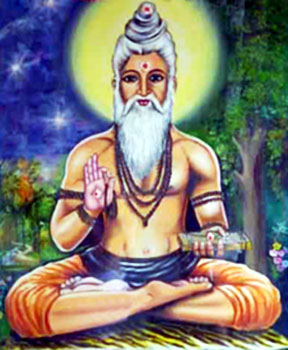 Horse Sacrifice of Dasaratha is one of the incidents narrated in the Bala Kanda of Ramayana by Valmiki. There was once a beautiful and a great city known as Ayodhya which was unconquerable in the country of Koshala. The subjects were righteous and happy, well read and contented, truthful, well provided with goods, self-restrained and charitable and full of faith. Their ruler was Dasharatha, a veritable Manu amongst men, and a moon amongst the stars. He had many wise counsellors including Kashyapa and Markandeya, and had two other saintly priests attached to his family, called Vashishtha and Vamadeva. To another great sage, Rishyasringa, he gave his daughter Santa. His ministers were such men who counsel and judge things finely; they were well versed in the arts of policy and ever fair-spoken. Only one desire of Dasharatha which was unsatisfied was that, he had no son to carry on his line.
Horse Sacrifice of Dasaratha is one of the incidents narrated in the Bala Kanda of Ramayana by Valmiki. There was once a beautiful and a great city known as Ayodhya which was unconquerable in the country of Koshala. The subjects were righteous and happy, well read and contented, truthful, well provided with goods, self-restrained and charitable and full of faith. Their ruler was Dasharatha, a veritable Manu amongst men, and a moon amongst the stars. He had many wise counsellors including Kashyapa and Markandeya, and had two other saintly priests attached to his family, called Vashishtha and Vamadeva. To another great sage, Rishyasringa, he gave his daughter Santa. His ministers were such men who counsel and judge things finely; they were well versed in the arts of policy and ever fair-spoken. Only one desire of Dasharatha which was unsatisfied was that, he had no son to carry on his line.
Since the king Dasaratha desperately needed a son to be his heir, after many vain austerities, he made up his mind at last on the greatest of all offerings - a horse sacrifice; and calling the family priests and other Brahmans, he gave all necessary orders for this undertaking. Then, returning to the inner rooms of the palace, he told his three wives what had been set afoot, whereat their faces shone with joy, like lotus-flowers in early spring. After almost a year from the date of horse sacrifice, the horse which was set free returned, and Rishyasringa and Vashishtha performed the ceremony, and there was great festivity and gladness. Then Rishyasringa told the king that four sons would be born to him, perpetuators of his race; at which sweet words the king rejoiced exceedingly. Now at this time all the deities were assembled there to receive their share of the offerings made, and being assembled together they approached Brahma with a petition.
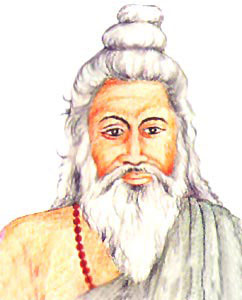 All the deities assembled in front of Brahma and requested him to help them from the evil works of the notorious rakshasa Ravana whom Lord Brahma granted a boon that he will not be slain by gandharvas, or yakshas, or rakshasas, or gods. Brahma replied that the evil rakshasa disdained to ask from him immunity from the attack of men and thus by man only the demon shall be slain. By hearing this, the deities rejoiced. At that time, arrived the great God Vishnu, clad in yellow robes, bearing mace and discus and conch, and riding upon Garuda. The deities reverenced, and prayed him to take birth as the four sons of Dasharatha for the destruction of the wily and irrepressible Ravana. Then that one of lotus-eyes, making of him four beings, chose Dasharatha for his father and disappeared. In a strange form, like a flaming tiger, he reappeared in the sacrificial fire of Dasharatha and, greeting him, named himself as the messenger of God. He told Dasaratha to distribute the divine milk and rice amongst his wives.
All the deities assembled in front of Brahma and requested him to help them from the evil works of the notorious rakshasa Ravana whom Lord Brahma granted a boon that he will not be slain by gandharvas, or yakshas, or rakshasas, or gods. Brahma replied that the evil rakshasa disdained to ask from him immunity from the attack of men and thus by man only the demon shall be slain. By hearing this, the deities rejoiced. At that time, arrived the great God Vishnu, clad in yellow robes, bearing mace and discus and conch, and riding upon Garuda. The deities reverenced, and prayed him to take birth as the four sons of Dasharatha for the destruction of the wily and irrepressible Ravana. Then that one of lotus-eyes, making of him four beings, chose Dasharatha for his father and disappeared. In a strange form, like a flaming tiger, he reappeared in the sacrificial fire of Dasharatha and, greeting him, named himself as the messenger of God. He told Dasaratha to distribute the divine milk and rice amongst his wives.
In due time four sons were born of them, sharing the self of Vishnu - from Kaushalya, Rama; from Kaikeyi, Bharata; and from Sumitra, Lakshmana and Satrughna; and these names were given to them by Vashishtha. Meanwhile the gods created mighty monkey-hosts, brave and wise and swift, shape-shifters, hardly to be slain, to be the helpers of the heroic Vishnu in the battle with the rakshasas. Thus starts the childhood days of the four sons of the King Dasaratha of Ayodhya.
Death of Dasaratha
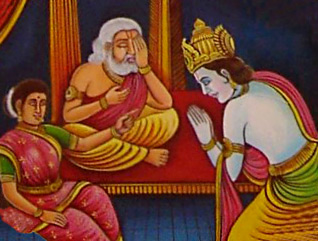 Death of Dasaratha after the exile of Rama, Lakshmana and Sita is narrated in the Ayodhya Kanda. Rama, after hearing from Kaikeyi about the two boons granted to her by Dasaratha, decided at once to go to the forest and asked for the coronation of Bharata to the throne of Ayodhya. Hearing about the banishment of Rama to the jungle for fourteen years, Lakshmana and Sita also decided to go along with Rama. Rama, Lakshmana and Sita together left Ayodhya for the jungle. Dasaratha, the king of Ayodhya, loved Rama very much and thus after Rama`s depart he was utterly struck with grief and remembered the curse which was given to him by a sage and his wife long ago.
Death of Dasaratha after the exile of Rama, Lakshmana and Sita is narrated in the Ayodhya Kanda. Rama, after hearing from Kaikeyi about the two boons granted to her by Dasaratha, decided at once to go to the forest and asked for the coronation of Bharata to the throne of Ayodhya. Hearing about the banishment of Rama to the jungle for fourteen years, Lakshmana and Sita also decided to go along with Rama. Rama, Lakshmana and Sita together left Ayodhya for the jungle. Dasaratha, the king of Ayodhya, loved Rama very much and thus after Rama`s depart he was utterly struck with grief and remembered the curse which was given to him by a sage and his wife long ago.
Meanwhile the kingdom of Ayodhya was transformed into a place of grief and mourning, without comfort for king or people after the departure of Rama, Lakshmana and Sita. On the fifth day of Rama`s exile, just when Kaushalya for a moment yielded to her sorrow and reproached her lord, there came into Dasaratha`s mind a recollection of a sin committed in a past life by means of an arrow-finding-its-mark-by-sound - which sin now bore the fruit of exile and death. Remembering this sin, he told Kaushalya the same night how the same was committed by him.
Dasaratha`s Sin
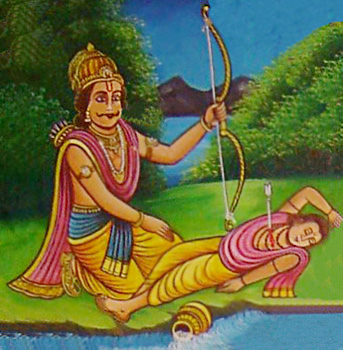 Long ago, when Dasaratha was a young king he was a skilled bowman. He could hit the aim by sound alone. Once when on a hunting expedition, by the river Sarayu, the young king heard a sound like the rilling of a water-jar or the roaring of an elephant. Then he shot an arrow in the direction of the sound, for it was dark, so that nothing could be seen and soon after heard moans and cries, and the king found a hermit named Shravan Kumar by the bank, pierced by his shaft. Shravan Kumar told the king of his estate and bade him seek his aged parents in the hermitage near by, and therewith he lost is breath, and left the king lamenting for his sin. Dasaratha then sought his father and his mother, who were anxious in mind because of their son`s delay, and confessed to them his deed; and the rishi, who by his curse might have burned him to a cinder, spared his life since he freely told him all that had befallen. But when the funeral pyre was ready, and those aged ones, called by a vision of their son, burned their bodies with his upon the pyre, they cursed the king saying that in the end the king of Ayodhya should meet his death by grieving for a son.
Long ago, when Dasaratha was a young king he was a skilled bowman. He could hit the aim by sound alone. Once when on a hunting expedition, by the river Sarayu, the young king heard a sound like the rilling of a water-jar or the roaring of an elephant. Then he shot an arrow in the direction of the sound, for it was dark, so that nothing could be seen and soon after heard moans and cries, and the king found a hermit named Shravan Kumar by the bank, pierced by his shaft. Shravan Kumar told the king of his estate and bade him seek his aged parents in the hermitage near by, and therewith he lost is breath, and left the king lamenting for his sin. Dasaratha then sought his father and his mother, who were anxious in mind because of their son`s delay, and confessed to them his deed; and the rishi, who by his curse might have burned him to a cinder, spared his life since he freely told him all that had befallen. But when the funeral pyre was ready, and those aged ones, called by a vision of their son, burned their bodies with his upon the pyre, they cursed the king saying that in the end the king of Ayodhya should meet his death by grieving for a son.
Dasaratha, thus, informs Kaushalya that the time has finally arrived for his death as uttered by the sage. Dasaratha told that he could not bear the pain of Rama`s exile into the forest and his state was like a smoking lamp that burns low when very little oil was left. Thus, calling Rama, Kaushalya, Sumitra, and addressing Kaikeyi as `cruel Kaikeyi` Raja Dasaratha died.
Bharata`s return from Girivraja to Ayodhya
When the news a Dasaratha`s death spread Ayodhya was plunged in deeper grief, for in a kingless country all goes amiss, rain does not fall, there are no rejoicings, nor prosperity, nor safety; a kingdom without a king is like a river without water, a wood without grass, a herd of kine without a keeper; a king is father and mother and takes care of the welfare of all men and creatures. Considering the situation, the palace officers and family priests took counsel, headed by Vashishta, to send envoys to Bharata, with a message that he should come at once for a matter that might not be delayed; but these envoys should not tell him anything of Rama`s exile or the king`s death. Riding in well-horsed cars, those envoys, going very swiftly, reached on an evening the wealthy city of Girivraja, in Kekaya, where Bharata was lodged with his maternal uncle. That same night Bharata dreamt many evil dreams and might not be comforted. The envoys entered and were well received.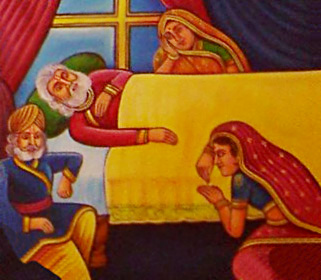 Bharata inquired if all was well with his father and mothers and brothers, and was assured that it was even so. Then the ambassadors delivered their message, and Bharata told his uncle and his grandfather, and took leave to go to Ayodhya. They conferred on him many gifts, as woolen clothes and deer-skins and elephants and dogs and swift horses; but he, filled with anxiety because of the dreams and the very hasty journey of the envoys, had little pleasure in the gifts, and taking with him Shatrughna, he departed quickly to Ayodhya.
Bharata inquired if all was well with his father and mothers and brothers, and was assured that it was even so. Then the ambassadors delivered their message, and Bharata told his uncle and his grandfather, and took leave to go to Ayodhya. They conferred on him many gifts, as woolen clothes and deer-skins and elephants and dogs and swift horses; but he, filled with anxiety because of the dreams and the very hasty journey of the envoys, had little pleasure in the gifts, and taking with him Shatrughna, he departed quickly to Ayodhya.
Kaikeyi`s son beheld that best of cities at sunrise on the seventh day. Seeing that all was dark and silent in that place of sadness, and beholding many inauspicious sights foreboding ill, Bharata entered the royal palace with a heavy heart. Not seeing his father in his quarters, he sought his mother Kaikeyi and touched her feet. She rose from her golden seat delighted, and asked him of his welfare and his journey. This he told her, and he asked for the king and enquired if his father is with mother Kaushalya. Bharata asked for Rama as he addressed him as his father, brother and friend and also searched for Dasaratha. Then Kaikeyi told Bharata everything as to how his father died and about the two boons for which Rama along with Lakshmana and Sita went into exile in the forest for fourteen years and how she planned for his coronation to the throne of Ayodhya. Bharata asked Kaikeyi about the last words uttered by his father at the time of his death and Kaikeyi told that the king last told that those would be most fortunate who would see Rama, along with Lakshmana and Sita returning from exile to Ayodhya.
After hearing everything Bharata became furious and blamed Kaikeyi as Dasaratha`s murderer. Then he told Kaikeyi that she had no idea of his love for Rama and made up his mind to bring back Rama from exile. He cursed his mother that she would suffer misery in this world and also after death. Then came Kaushalya and Vashishtha and greeted Bharata; and, guided by that skilful sage, Bharata performed all funeral rites of his father, and with his mothers walked sun wise around the burning pyre, and after mourning for ten days gathered up the ashes. Then, as he still grieved out of all measure, Vashishtha counseled him, discoursing of the birth and death of beings and the fate of every creature. Thus comforted, those chiefs of men held up their heads again, like Indra`s shining banner stained by sun and rain.



















